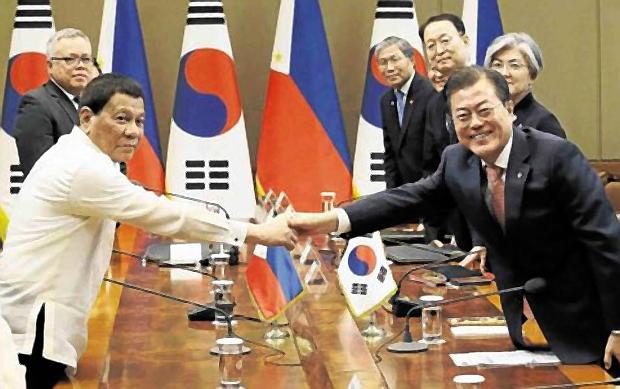
President Rodrigo Duterte and South Korean President Moon Jae-in meet for talks on renewing ties between the two countries at the Blue House in Seoul on Monday, on June 4, 2018. Both countries are marking 70 years of relations in 2019. (File photo from AFP)
MANILA, Philippines — The Philippines and South Korea want to finish a free trade deal by November, a move that will make it easier for local bananas, among other goods, to enter the Korean market, top officials said.
In a joint statement issued last week, the trade chiefs of both governments said they had agreed to “put their best effort” to conclude the talks in November.
The conclusion of the talks, they said, would be in time for the commemorative summit of the Republic of Korea (ROK) and the Association of Southeast Asian Nations (Asean).
That same month will also mark the 70th anniversary of the diplomatic relations of South Korea and the Philippines, the Department of Trade and Industry (DTI) said in a separate statement.
Prior to this, the Philippines has had relatively improved market access to South Korea through the Asean-Korean free trade area, which took effect about a decade ago.
Data from the Philippine Statistics Authority show, however, that the Philippines’s exports to South Korea dropped heavily last year, while the latter’s imports to the Philippines increased.
The Philippines exported $2.54 billion worth of goods to South Korea last year, a 41.3 percent decline from the $4.33 billion in 2017. South Korea was the Philippines’ ninth export top export market in 2018. DTI said the Philippines’ top exports to Korea include bananas, pineapples, and copper.
On the other hand, the Philippines imported $11.16 billion worth of products last year, a 31.9 percent increase from the $8.47 billion recorded in 2017. South Korea was the Philippines’ 3rd top import market. DTI said the Philippines imports mainly industrial products from South Korea.
There are also ongoing talks through the Regional Comprehensive Economic Partnership (RCEP), a mega trade deal that includes South Korea.
The Philippines will build on those previous and ongoing talks, including previous bilateral market access consultations, Trade Undersecretary Ceferino Rodolfo told the INQUIRER in a phone interview.
How soon the FTA will enter into force is yet to be seen. If talks do conclude in November, this will be the Philippines’ second bilateral FTA, following the one with Japan more than a decade ago.
For now, hurdles for Philippine exports still remain. For example, bananas from the Philippines are currently slapped with a 30-percent tariff in South Korea.
Although the Philippines is the largest banana supplier in South Korea, its 85 percent market share there is under threat as Central American countries, which enjoy zero tariff for their exports, begin to increase their share, according to a previous statement from the Pilipino Banana Growers and Exporters Association (PBGEA).
“That’s one of the tangible benefits [we’ll be getting from the FTA],” Trade Undersecretary Ceferino Rodolfo told the INQUIRER, referring to easier market access for Philippine bananas.
/atm